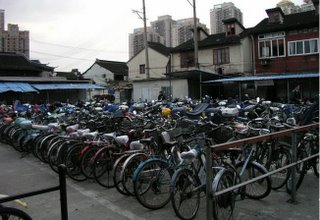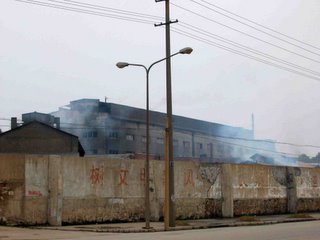Awake at the wrong hour, I got up to read and decided to look into an article about South Dakota Judicial Accountability (SDJA), an "organization" that recently submitted petitions to put an anti-judicial measure on the state's ballot. It's headed by William Stegmeier, owner of a livestock feed grinder manufacturing company.
His initiative would remove state judges' immunity from lawsuits over their judicial acts. You can read more about Stegmeier and his flawed quest
here, but it's hard to draw conclusions about how legit this misguided movement really is. After all, the man collected 46,800 signatures in support of a concept serious legal scholars consider dangerous to democracy... in a state with only 527,000 registered voters!
Digging into
his website led me further into a deep spiral of relationships that say a lot about the roots of the "stop activist judges" movement. SDJA is a state branch of the JAIL (Judicial Accountability Initiative Law) campaign to "end the rampant and pervasive judicial corruption" in US legal system. The organization helpfully provides
proposed initiatives for your state, too.
JAIL4Judges founder
Ron Branson turns out to have a tale that seems typical of these judicial crusaders.
Born in 1946, Ronald Branson joined the U.S. Military in 1963. He had a very strict and straight-laced view of "just doing his job." Part of his military time was spent as a Prison Chaser over prisoners at Fort Belvoir, VA. He presided over work details and regularly strip-searched the prisoners. He quickly gained the respect of his superiors, and took on the reputation as the strictest Prison Chaser within the prison compound, having disciplined more prisoners than all other Prison Chasers collectively.
Rigid, aggressive, but also submissive to authority, these guys start as cops or capos. Not really believers in the system, but certainly efficient cogs. But then they fall out for one reason or another, and they seek another system to take them in.
After his honorable discharge from the military, Ron entered Washington Bible College, and later graduated from two Bible Institutes .... In 1974 he became the author and publisher of the Alert Sheet Publications, a documentary which exposed cults and other religious organizations. He was ordained into the ministry in 1977 and pastored several churches. He began to realize that the biggest cult and threat to the churches was government, after which he began the Alert Sheet Informant, a publication which exposed government corruption ... In 1980 Mr. Branson was called upon to travel with and meet appointments by the late A. J. Porth, the patriarch of the modern-day patriot movement, as his right-hand man.

[No, this isn't Branson. This is Harvey Kash of Americans for Legal Reform. Thanks to
the fink file for tipping me to these boys.]
And so they continue, small timers distant from real civic affairs, but big men in their disaffected circle of others who are aggressive and single-minded enough to make some money out of unglamorous pursuits — well drilling, industrial gaskets, chiropractic and small-time ministry in places like Tea, SD, Kamiah, ID, and Lost Springs, KS.
They can hang in their VFW halls, intimidate their wives, indoctrinate their kids, annoy their neighbors, cheat on their taxes and still remain invisible men. But then something else happens.
A DWI. A missed child support payment. A deer taken without a tag. A parking ticket. A property dispute. All normal blue collar libertarian crimes. But suddenly this gives focus to the good soldier's sense of grievance over a humdrum life: The system is responsible for my pain. And unlike the ghetto dweller who never bought into the system, this believer's pain over oppression is doubled by a sense of betrayal.
Ron's legal pursuits within the courts began in 1982 when he engaged the County of Los Angeles over their refusal to give a mandatory civil service hearing to a sixteen year employee of the county holding civil service protection ...
The straw that broke the camel's back was in 1994 in which Mr. Branson brought suit against the City of Los Angeles and seven police officers for thirteen and a half million dollars for false arrest, false imprisonment and unwarranted strip-search and numerous other causes of action.
The once-master strip-searcher is allegedly strip-searched and his humiliation is complete. Though his biography mentions the strip-search, it is less clear about the legal issue that launched his campaign: a dispute over an unpaid parking ticket. I don't recommend reading his
40-page petition to the US Supreme Court. One paragraph in the patriarch's bio puts it more succinctly:
All attempts by Mr. Branson to bring his case to a final judgment through the courts and then the Legislature failed. He realized that the law on the books was a façade to give the public the impression that we had laws that governed our society. Mr. Branson realized that if there were to change at all in society, it would not come from within the government, but would have to be done by going directly to the People through the initiative process. After a period of eighteen years of seeking redress by pursuing due process of law, Mr. Branson was then pursuing his fourteenth case to the United States Supreme Court. The results were always certain and predictable.
Well, yes, one would hope so in this case.
Organizations like Dr. Rick Scarborough's
Vision America — with its tentacles to semi-mainstream fringe figures like Gary Bauer, Alan Keyes, and yes, Tom DeLay — look positively genteel by comparison. Like Stegmeier, Branson and others, they pretend to appeal to high Constitutional principles, but they tap into the same troubled, unbalanced base of support.
Next time — Christians who hate Bush; anti-war and anti-judge cops; and artists who don't like, well, see for yourself...

KISS OF DEVIL (THE TWO HONORABLE JUDGES)
— Franciszek (Frank) C. Kulon


























